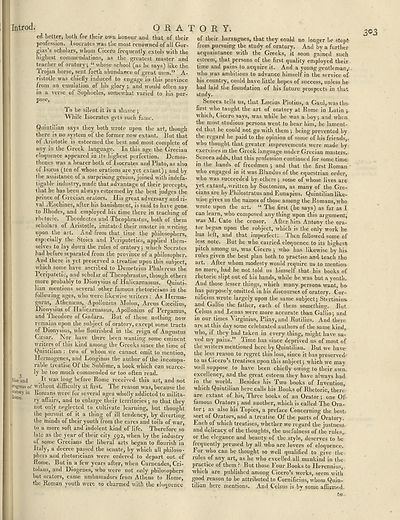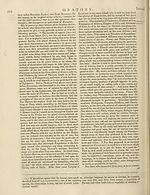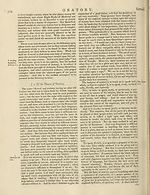Encyclopaedia Britannica > Volume 15, NIC-PAR
(353) Page 303
Download files
Complete book:
Individual page:
Thumbnail gallery: Grid view | List view

Introd. O ft A
cd better, both for their own honour and that of their
profession. Isocrates was the moftt renowned of all Gur-
gias’s scholars, whom Cicero frequently extols with the
highest commendations, as the greatest master and
teacher of oratory; “ whose school (as he says) like the
Trojan horse, sent forth abundance of great men.” A-
ristotle was chiefly induced to engage in this province
from an emulation of his glory ; and would often say
in a verse of Sophocles, somewhat varied to his pur¬
pose,
To be silent it is a shame;
While Isocrates gets such fame.
Quintilian says they both wrote upon the art, though
there is no system of the former now extant. But that
of Aristotle is esteemed the best and most complete of
any in the Greek language. In this age the Grecian
eloquence appeared in its highest perfection. Demos¬
thenes was a hearer both of Isocrates and Plato, as also
of Isseus (ten of whose orations are yet extant) ; and by
the assistance of a surprising genius, joined with indefa¬
tigable industry, made that advantage of their precepts,
that he has been always esteemed by the best judges the
prince of Grecian orators. His great adversary and ri¬
val -ZEschines, after his banishment, is said to have gone
to Rhodes, and employed his time there in teaching of
rhetoric. Theodectes and Theophrastus, both of them
scholars of Aristotle, imitated their master in writing,
upon the art. And from that time the philosophers^
especially the Stoics and Peripatetics, applied them¬
selves to lay down the rules of oratory; which Socrates
bad before separated from the province of a philosopher.
And there is yet preserved a treatise upon this subject,
which some have ascribed to Demetrius Pbalereus the
Peripatetic, and scholar of Theophrastus, though others
more probably to Dionysius of Halicarnassus. Quinti-.
lian mentions several other famous rhetoricians in the
following ages, who were likewise writers : As Herma-
goras, Athemeus, Apollonius Molon, Areus Ccecilius,
Dionysius of Halicarnassus, Apollonius of Pergamus,
and Theodore of Gadara. But of these nothing now
remains upon the subject of oratory, except some tracts
of Dionysius, who flourished in the reign of Augustus
Caesar. Nor have there been wanting some eminent
writers of this kind among the Greeks since the time of
Quintilian : two ol whom we cannot omit to mention,
Hermogenes, and Longinus the author of the incompa¬
rable treatise Ot the Sublime, a book which can scarce-
^ ly he too much commended or too often read,
tiseand .I1 was ,loilg before Rome received this art, and not
irogrcss of without difficulty at first. The reason was, because the
^tory in Romans were for several ages wholly addicted to milita-
onic- ry aflairs, and to enlarge their territories; so that they
not only neglected to cultivate learning, hut thought
the pursuit of it a thing of ill tendency, by diverting
the minds of their youth from the cares and toils of war,
to a more soft and indolent kind of life. Therefore so
late as the year of their city 592, when by the industry
of some Grecians the liberal arts began to flourish in
Italy, a decree passed the senate, by which all philoso¬
phers and rhetoricians were ordered to depart out of
Itome. But in a few years after, when Carneades, Cri-
tolaus, and Diogenes, who were not only philosophers
hut orators, came ambassadors from Athens to Rome,
the Roman youth were so charmed with the eloquence
r O R Y.
of their harangues, that they eould no longer he stopfr
from pursuing the study of oratory. And by a further
acquaintance with the Greeks, it soon gained such
esteem, that persons of the first quality employed their
time and pains to acquire it. And a young gentleman,;
wdio was ambitious to advance himself in the service of-
his country, could have little hopes of success, unless he
had laid the foundation of his future prospects in that
study.
Seneca tells us, that Lucius Plotius, a Gaul, was the-
first who taught the art of oratory at Rome in Latin p
which, Cicero says, was while he was a boy; and when
the most studious persons went to hear him, he lament¬
ed that he could not go with them ; being prevented by
the regard he paid to the opinion ot some of his friends,,
who thought that greater improvements were made by
exeicises in the Greek language under Grecian masters.
Seneca adds, that this profession continued for some time
in the hands of freedmen ; and that the first Roman
who engaged in it was Blandus of the equestrian order,
who was succeeded by others; some of whose lives are
yet extant,.written hy Suetonius, as many of the Gre¬
cians are by Philostratus and Eunapius. Quintilian like¬
wise gives us the names of those among the Romans, who
wrote upon the art. “ The first (he says) as far as I
can learn, w'ho composed any thing upon this argument^
was M. Cato the censor. After hinv Antony the ora¬
tor began upon the subject, which is the only wmrk he
has left, and that imperfect; 1 hen followed some of
less note. But he who carried eloquence to its highest
pitch among us, was Cicero ; who has likewise by hia
rules given the best plan both to practise and teach the
art. After whom modesty would require us to mention
no more, had he not told us himself that his books of
rhetoric slipt out of his hands, while he was but a youth.
And those lesser things, which many persona want, he-
has purposely omitted, in his discourses of oratory. Cor-
nificius wrote largely upon the same subject; Stertiniua
and Gallio the father, each of them something. But
Celsus and Lenas were more accurate than Gallio; and
in our times \ irginius, Pliny, and Rutilius. And there
are at this day some celebrated authors of the same kind,
who, if they had taken in every thing, might have sa¬
ved my pains.” lime has since deprived us of most of
the writers mentioned here hy Quintilian. Rut we have
the less reason to regret this loss, since it has preserved'
to us Cicero’s treatises upon this subject; which wre may
well suppose to have been chiefly owing to their own
excellency, and the great esteem they have always had
in the world. Besides his Two books of Invention,
which Quintilian here calls his Books of Rhetoric, there
are extant of his, Three books of an Orator; one Of
famous Orators; and another, which is called The Ora¬
tor; as also his lopics, a preface Concerning the best-
sort of Oiators, and a treatise Of the parts of Oratory.
Lach of which treatises, whether we regard the justness-
and delicacy of the thoughts, the usefulness of the rules,,
or the elegance and beauty of the style, deserves to be
frequently perused by all who are lovers of eloquence.
For who can be thought so well qualified to give the
rules of any art, as he who excelled.all mankind in the
practice of them ? Rut those I our Books to Herennius,.
which are published among Cicero’s works, seem with
good reason to he attributed to Cornificius, whom Quin¬
tilian here mentions. And Celsus is by some affirmed.
to
3°3
cd better, both for their own honour and that of their
profession. Isocrates was the moftt renowned of all Gur-
gias’s scholars, whom Cicero frequently extols with the
highest commendations, as the greatest master and
teacher of oratory; “ whose school (as he says) like the
Trojan horse, sent forth abundance of great men.” A-
ristotle was chiefly induced to engage in this province
from an emulation of his glory ; and would often say
in a verse of Sophocles, somewhat varied to his pur¬
pose,
To be silent it is a shame;
While Isocrates gets such fame.
Quintilian says they both wrote upon the art, though
there is no system of the former now extant. But that
of Aristotle is esteemed the best and most complete of
any in the Greek language. In this age the Grecian
eloquence appeared in its highest perfection. Demos¬
thenes was a hearer both of Isocrates and Plato, as also
of Isseus (ten of whose orations are yet extant) ; and by
the assistance of a surprising genius, joined with indefa¬
tigable industry, made that advantage of their precepts,
that he has been always esteemed by the best judges the
prince of Grecian orators. His great adversary and ri¬
val -ZEschines, after his banishment, is said to have gone
to Rhodes, and employed his time there in teaching of
rhetoric. Theodectes and Theophrastus, both of them
scholars of Aristotle, imitated their master in writing,
upon the art. And from that time the philosophers^
especially the Stoics and Peripatetics, applied them¬
selves to lay down the rules of oratory; which Socrates
bad before separated from the province of a philosopher.
And there is yet preserved a treatise upon this subject,
which some have ascribed to Demetrius Pbalereus the
Peripatetic, and scholar of Theophrastus, though others
more probably to Dionysius of Halicarnassus. Quinti-.
lian mentions several other famous rhetoricians in the
following ages, who were likewise writers : As Herma-
goras, Athemeus, Apollonius Molon, Areus Ccecilius,
Dionysius of Halicarnassus, Apollonius of Pergamus,
and Theodore of Gadara. But of these nothing now
remains upon the subject of oratory, except some tracts
of Dionysius, who flourished in the reign of Augustus
Caesar. Nor have there been wanting some eminent
writers of this kind among the Greeks since the time of
Quintilian : two ol whom we cannot omit to mention,
Hermogenes, and Longinus the author of the incompa¬
rable treatise Ot the Sublime, a book which can scarce-
^ ly he too much commended or too often read,
tiseand .I1 was ,loilg before Rome received this art, and not
irogrcss of without difficulty at first. The reason was, because the
^tory in Romans were for several ages wholly addicted to milita-
onic- ry aflairs, and to enlarge their territories; so that they
not only neglected to cultivate learning, hut thought
the pursuit of it a thing of ill tendency, by diverting
the minds of their youth from the cares and toils of war,
to a more soft and indolent kind of life. Therefore so
late as the year of their city 592, when by the industry
of some Grecians the liberal arts began to flourish in
Italy, a decree passed the senate, by which all philoso¬
phers and rhetoricians were ordered to depart out of
Itome. But in a few years after, when Carneades, Cri-
tolaus, and Diogenes, who were not only philosophers
hut orators, came ambassadors from Athens to Rome,
the Roman youth were so charmed with the eloquence
r O R Y.
of their harangues, that they eould no longer he stopfr
from pursuing the study of oratory. And by a further
acquaintance with the Greeks, it soon gained such
esteem, that persons of the first quality employed their
time and pains to acquire it. And a young gentleman,;
wdio was ambitious to advance himself in the service of-
his country, could have little hopes of success, unless he
had laid the foundation of his future prospects in that
study.
Seneca tells us, that Lucius Plotius, a Gaul, was the-
first who taught the art of oratory at Rome in Latin p
which, Cicero says, was while he was a boy; and when
the most studious persons went to hear him, he lament¬
ed that he could not go with them ; being prevented by
the regard he paid to the opinion ot some of his friends,,
who thought that greater improvements were made by
exeicises in the Greek language under Grecian masters.
Seneca adds, that this profession continued for some time
in the hands of freedmen ; and that the first Roman
who engaged in it was Blandus of the equestrian order,
who was succeeded by others; some of whose lives are
yet extant,.written hy Suetonius, as many of the Gre¬
cians are by Philostratus and Eunapius. Quintilian like¬
wise gives us the names of those among the Romans, who
wrote upon the art. “ The first (he says) as far as I
can learn, w'ho composed any thing upon this argument^
was M. Cato the censor. After hinv Antony the ora¬
tor began upon the subject, which is the only wmrk he
has left, and that imperfect; 1 hen followed some of
less note. But he who carried eloquence to its highest
pitch among us, was Cicero ; who has likewise by hia
rules given the best plan both to practise and teach the
art. After whom modesty would require us to mention
no more, had he not told us himself that his books of
rhetoric slipt out of his hands, while he was but a youth.
And those lesser things, which many persona want, he-
has purposely omitted, in his discourses of oratory. Cor-
nificius wrote largely upon the same subject; Stertiniua
and Gallio the father, each of them something. But
Celsus and Lenas were more accurate than Gallio; and
in our times \ irginius, Pliny, and Rutilius. And there
are at this day some celebrated authors of the same kind,
who, if they had taken in every thing, might have sa¬
ved my pains.” lime has since deprived us of most of
the writers mentioned here hy Quintilian. Rut we have
the less reason to regret this loss, since it has preserved'
to us Cicero’s treatises upon this subject; which wre may
well suppose to have been chiefly owing to their own
excellency, and the great esteem they have always had
in the world. Besides his Two books of Invention,
which Quintilian here calls his Books of Rhetoric, there
are extant of his, Three books of an Orator; one Of
famous Orators; and another, which is called The Ora¬
tor; as also his lopics, a preface Concerning the best-
sort of Oiators, and a treatise Of the parts of Oratory.
Lach of which treatises, whether we regard the justness-
and delicacy of the thoughts, the usefulness of the rules,,
or the elegance and beauty of the style, deserves to be
frequently perused by all who are lovers of eloquence.
For who can be thought so well qualified to give the
rules of any art, as he who excelled.all mankind in the
practice of them ? Rut those I our Books to Herennius,.
which are published among Cicero’s works, seem with
good reason to he attributed to Cornificius, whom Quin¬
tilian here mentions. And Celsus is by some affirmed.
to
3°3
Set display mode to:
![]() Universal Viewer |
Universal Viewer | ![]() Mirador |
Large image | Transcription
Mirador |
Large image | Transcription
Images and transcriptions on this page, including medium image downloads, may be used under the Creative Commons Attribution 4.0 International Licence unless otherwise stated. ![]()
| Encyclopaedia Britannica > Encyclopaedia Britannica > Volume 15, NIC-PAR > (353) Page 303 |
|---|
| Permanent URL | https://digital.nls.uk/192586287 |
|---|
| Attribution and copyright: |
|
|---|
| Shelfmark | EB.11 |
|---|---|
| Description | Ten editions of 'Encyclopaedia Britannica', issued from 1768-1903, in 231 volumes. Originally issued in 100 weekly parts (3 volumes) between 1768 and 1771 by publishers: Colin Macfarquhar and Andrew Bell (Edinburgh); editor: William Smellie: engraver: Andrew Bell. Expanded editions in the 19th century featured more volumes and contributions from leading experts in their fields. Managed and published in Edinburgh up to the 9th edition (25 volumes, from 1875-1889); the 10th edition (1902-1903) re-issued the 9th edition, with 11 supplementary volumes. |
|---|---|
| Additional NLS resources: |
|

